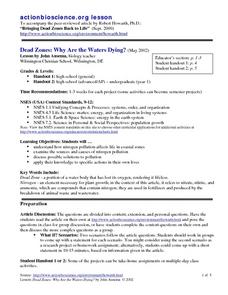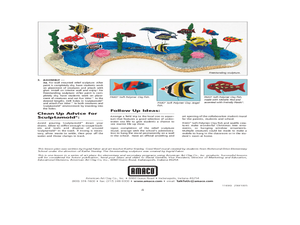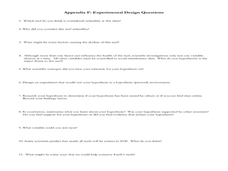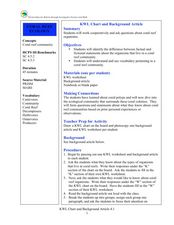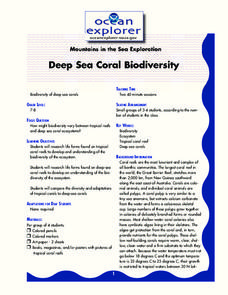Curated OER
Dinnertime On The Reef
Students identify the main parts of a coral reef. They describe a coral reef food chain.
Curated OER
Save A Reef!
Pupils identify the major threats to coral reefs and the ways that they benefit from humans. In this coral reef conservation lesson students create a public education program on coral reefs.
Aquarium of the Pacific
Ecosystem Comparison
Fifth graders examine plants and animals in two ecosystems and compare them. In this ecosystem survival instructional activity, 5th graders compare and contrast a coral reef and kelp forest ecosystem. Students investigate the...
Curated OER
Biotic and Abiotic Factors
In this biotic and abiotic factors activity, students complete 20 various types of questions related to biotic and abiotic factors. First, they write the vocabulary word that best completes the sentence. Then, students state an example...
Curated OER
Dead Zones: Why Are the Waters Dying?
Students investigate the effects of pollution on marine ecosystems. They read and discuss an article, identify the effects of pollution on marine life, conduct research on local nutrient pollution, and conduct local water quality studies.
Curated OER
Deep Gardens
Marine biology beginners read about the 2005 Florida Coast Deep Corals expedition, research phylum Cnidaria, and then report on a specific coral deep-sea coral group. There is an abundance of background information and internet resources...
American Museum of Natural History
Cuban Wildlife Matching Game
Young biologists match Cuban wildlife to their ecosystems by dragging images of the creatures to either a forest, coral reef, cave, or wetland habitat.
ARKive
Dinner at the Reef
Fine dining can happen anywhere, even in the coral reefs. Budding environmentalists explore marine food chains, predator-prey relationships and the importance of a balanced ecosystem. These important concepts are facilitated through a...
Curated OER
Coral Reefs Endangered
Students research where in the world coral reefs are located. In this ecology lesson, students create food chains and food web. They simulate growing coral reefs to understand their characteristics better.
Florida International University
Are You Concentrating?
Explore the importance of a concentration gradient in the rates of dissolution. Using the ocean ecosystem, learners study rates of dissolution around coral reefs. A hands-on experiment helps individuals discover the effects of changing a...
Curated OER
Exploring Life in the Coral Reef
Students study life forms in coral reefs. In this ocean life lesson, students study life in coral reefs as they create a coral reef sculpture.
Curated OER
A Reef of Your Own
Students study the reproductive strategies of reef building corals. In this coral reef lesson students describe the behaviors of reef building corals and their nutritional strategies.
Curated OER
Marine Biology Lesson on Understanding the Dynamics of the Reef Ecosystem
Students compare data from a healty and unhealthy reef ecosystem. In this marine biology lesson plan, students identify which sample is stressed. They formulate a hypothesis on why the reef is stressed and support their hypothesis with...
Curated OER
KWL Chart and Background Article
Students discuss an ecosystem. In this coral reef lesson, students fill in their own KWL chart and contribute ideas to a whole class KWL chart. They read an article as a class to spark ideas for facts they can add to the "K" part of the...
Moorea Coral Reef Long-Term Ecological Research Program
Paper Plate Fishes
Tropical fish make great art projects! Use paper plates to design, color, and assemble round and oval-shaped fish based on photographs of actual fish found along the Moorea Coral Reef. Kids learn about different fins- including the...
Curated OER
Sea Scape
Students learn about and make models of coral reefs. In this reef ecosystem lesson, the class locates a number of coral reefs on a map. They learn how a coral reef is a balanced ecosystem that depends upon all of it's plant and animal...
Curated OER
Deep Sea Coral Biodiversity
Young scholars research life forms on tropical coral reefs in order to explore the biodiversity of the ecosystem. In this biodiversity lesson plan students work in groups and complete their coral reef activity.
Curated OER
Coral Bleaching
High schoolers examine the relationship between corals and zooxanthellae, identify stresses to corals, and explain coral bleaching. In this sea life lesson students predict the effects of increased temperatures on coral reefs.
Curated OER
A Reef of Your Own
Students research and study the life and reproductive strategies of reef building corals. They examine how coral reefs can produce high levels of biological material when they are surviving in areas of low nutrition.
Curated OER
Seals, Corals, and Dollars...
Students explore the interdependence of animals and their habitat. In this Hawaiian ecology lesson, students work in groups to research the necessity of preserving precious coral as a habitat for monk seals. Students prepare...
Curated OER
Saved by a Shark
Middle schoolers explore the marine ecosystem and the importance of sharks. In this shark lesson, students look at photos of the Flower Garden Banks National Marine Sanctuary and discuss the animals that live there. They discuss which...
Curated OER
Fish Are Animals Too
Students create posters that show how a shark is a major predator in kelp forests and coral reefs after studying the food webs for these ecosystems. They determine that fish are important animals in the ocean's web of life.
Curated OER
Into the Sea
Students display an awareness of the diversity of species in the coral reef, their habitat and adaptations. They conduct research to find and then color code the locations of coral reefs around the world.
Curated OER
Alien Invasion
Learners research how alien species can change an ecosystem. In this coral reef lesson, students describe invasive species and site evidence how these species came to be invasive and what control measures are possible.






